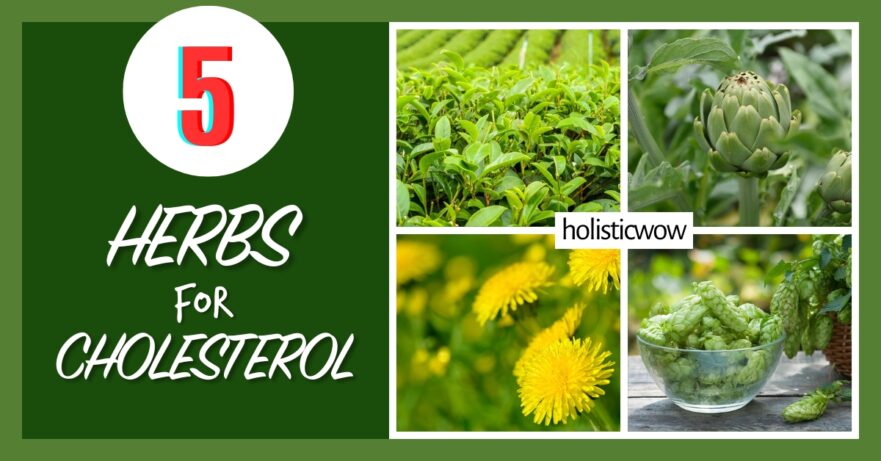In this article about herbs for cholesterol:
🌿 Best Herbs That Help Lower Cholesterol | 📜 Herbal Preparations and Recipes for Cholesterol Management | ☯️ Integrating Herbs into Daily Life for Bloating Relief | 🌱 Navigating Herbs Safely
High cholesterol is a silent but serious health concern affecting millions of Americans. It can lead to heart disease and stroke without showing noticeable symptoms. Regular blood tests are necessary to detect elevated cholesterol levels.
Several herbs show promise in supporting healthy cholesterol levels. Green tea, artichoke, and fenugreek are natural options that may help reduce cholesterol absorption and promote its excretion from the body.
This article explores six herbs that can potentially lower cholesterol naturally. We’ll examine their benefits, how to use them, and important safety considerations to help you make informed decisions about your heart health.
Key Takeaways
- 🍵 Green Tea Benefits: Green tea contains catechins that may reduce cholesterol absorption and increase its excretion from the body.
- 🌿 Artichoke’s Liver Support: Artichoke extract may help inhibit cholesterol production in the liver and increase bile production, supporting the elimination of excess cholesterol.
- 💪 Fenugreek’s Fiber Power: Fenugreek seeds are rich in soluble fiber that can help reduce cholesterol absorption in the intestines.
🌿 Best Herbs That Help Lower Cholesterol
High cholesterol is a common health concern that affects millions of Americans. While cholesterol is essential for various bodily functions, excessive levels can lead to serious cardiovascular issues. Symptoms of high cholesterol are not typically noticeable, which is why it’s often called a “silent” condition. However, it can be detected through blood tests that measure total cholesterol, LDL (low-density lipoprotein), HDL (high-density lipoprotein), and triglycerides.
Factors contributing to high cholesterol include genetics, diet high in saturated fats, lack of physical activity, obesity, and certain medical conditions. Managing cholesterol levels often involves lifestyle changes and sometimes medication. However, many people are turning to natural alternatives to support their cholesterol management efforts.
Several herbs have shown potential in helping to maintain healthy cholesterol levels. These include green tea (Camellia sinensis), artichoke (Cynara scolymus), dandelion (Taraxacum officinale), hops (Humulus lupulus), and fenugreek (Trigonella foenum-graecum).
Green tea (Camellia sinensis)
Green tea (Camellia sinensis) has been consumed for centuries in Asian cultures for its health benefits, including its potential to lower cholesterol levels. The main active compounds in green tea, called catechins, are powerful antioxidants that have been shown to reduce cholesterol absorption in the intestines and increase its excretion. Multiple studies have confirmed that regular consumption of green tea leads to a modest but statistically significant reduction in total and LDL cholesterol levels [1] [2]. For those looking to manage their cholesterol levels naturally, incorporating green tea into a daily routine offers a gentle and effective approach to supporting heart health.
Artichoke (Cynara scolymus)
Artichoke (Cynara scolymus) has long been used in Mediterranean cultures to support liver health and digestion. Recent studies suggest it may also help lower cholesterol. Artichoke contains compounds like cynarin and luteolin, which can enhance bile production, helping your body eliminate cholesterol. These compounds may also have antioxidant properties, further supporting heart health by reducing oxidative stress. While these effects are generally mild, research shows that artichoke extract can lead to modest reductions in total and LDL (bad) cholesterol levels [3] [4]. Artichoke supplements are well-tolerated but aren’t as strong as prescription medications, so they’re best used alongside other treatments rather than as a replacement.
Dandelion (Taraxacum officinale)
Dandelion (Taraxacum officinale) is often seen as a weed, but it has a long history in traditional medicine, particularly for liver and digestive support. While not as extensively studied for cholesterol management as other herbs, dandelion shows promise. It is rich in beta-carotene, vitamin C, and fiber, which may contribute to better cholesterol levels. The herb’s potential cholesterol-lowering effects are mainly linked to its ability to increase bile production, aiding in removing excess cholesterol. Additionally, dandelion’s diuretic properties can help reduce water retention [5], which may indirectly support cardiovascular health by lowering blood pressure. However, the evidence is preliminary, and more rigorous human studies are needed to confirm these benefits. Given its nutritional profile and potential liver support, dandelion is worth considering as part of a natural approach to cholesterol management.
Hops (Humulus lupulus)
Hops (Humulus lupulus) are best known for their role in brewing beer, but they’ve also been used in traditional medicine for centuries. Hops contain compounds called prenylated flavonoids, particularly xanthohumol, which have shown potential in animal studies to reduce cholesterol and triglyceride levels. These effects might be due to the inhibition of enzymes involved in cholesterol production and improvements in cholesterol metabolism, but more research, especially in humans, is needed to confirm these benefits. If you’re interested in natural ways to manage your cholesterol, hops supplements or teas could be worth trying, but they should be used alongside other proven methods.
Fenugreek (Trigonella foenum-graecum)
Fenugreek (Trigonella foenum-graecum) has been used for thousands of years in traditional medicine, particularly in Indian and Middle Eastern cultures. Known for supporting blood sugar control, fenugreek is also gaining attention for its potential to lower cholesterol. Fenugreek seeds are rich in soluble fiber, especially galactomannan, which can help reduce cholesterol absorption in the intestines. Additionally, the seeds contain saponins, which may interfere with cholesterol absorption and bile acid formation. Studies have shown that regular consumption of fenugreek can lead to reductions in total cholesterol, LDL cholesterol, and triglycerides [6]. While evidence for increasing HDL (good) cholesterol is mixed, some research suggests improvements in certain populations [7]. Fenugreek is generally safe for most people but may interact with blood-thinning medications and affect blood sugar levels.
📜 Herbal Preparations and Recipes for Cholesterol Management
These herbal tea blends are crafted to naturally support healthy cholesterol levels. Each recipe combines herbs traditionally known for their potential to assist in cholesterol management. Begin with the milder blends and progress to the more potent ones as needed.
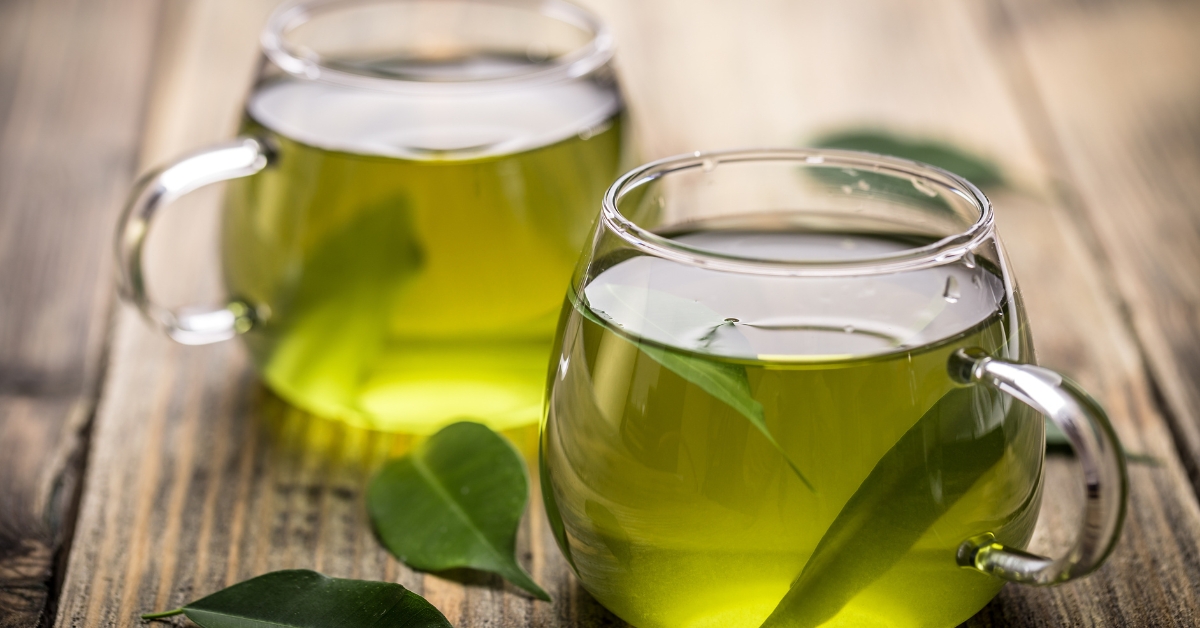
Gentle Cholesterol Support Tea
Ingredients:
- 1 teaspoon dried green tea leaves
- 1 teaspoon dried dandelion leaf
- ½ teaspoon dried artichoke leaf
- 1 cup of boiling water
Preparation:
- Combine all herbs in a teapot.
- Add boiling water and steep for 5-7 minutes.
- Strain and drink once daily, preferably in the morning.
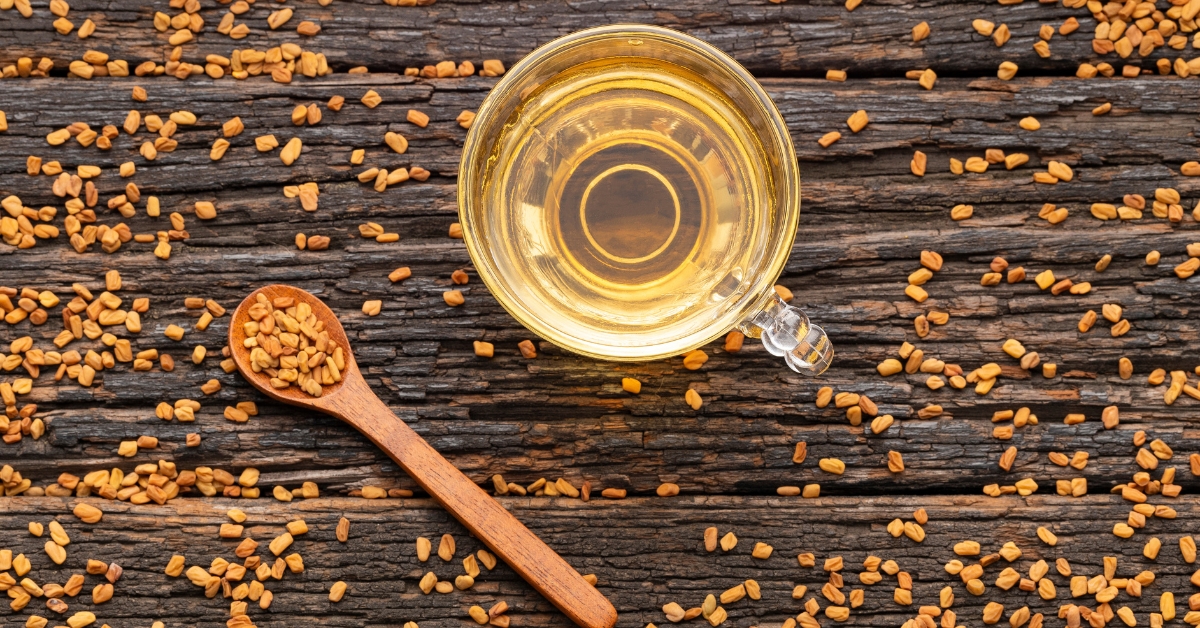
Fenugreek Fusion Blend
Ingredients:
- 1 teaspoon dried fenugreek seeds
- 1 teaspoon dried green tea leaves
- ½ teaspoon dried hops flowers
- 1 cup of boiling water
Preparation:
- Mix herbs in a teapot.
- Pour boiling water over the herbs and steep for 10 minutes.
- Strain and drink once daily, preferably before meals.
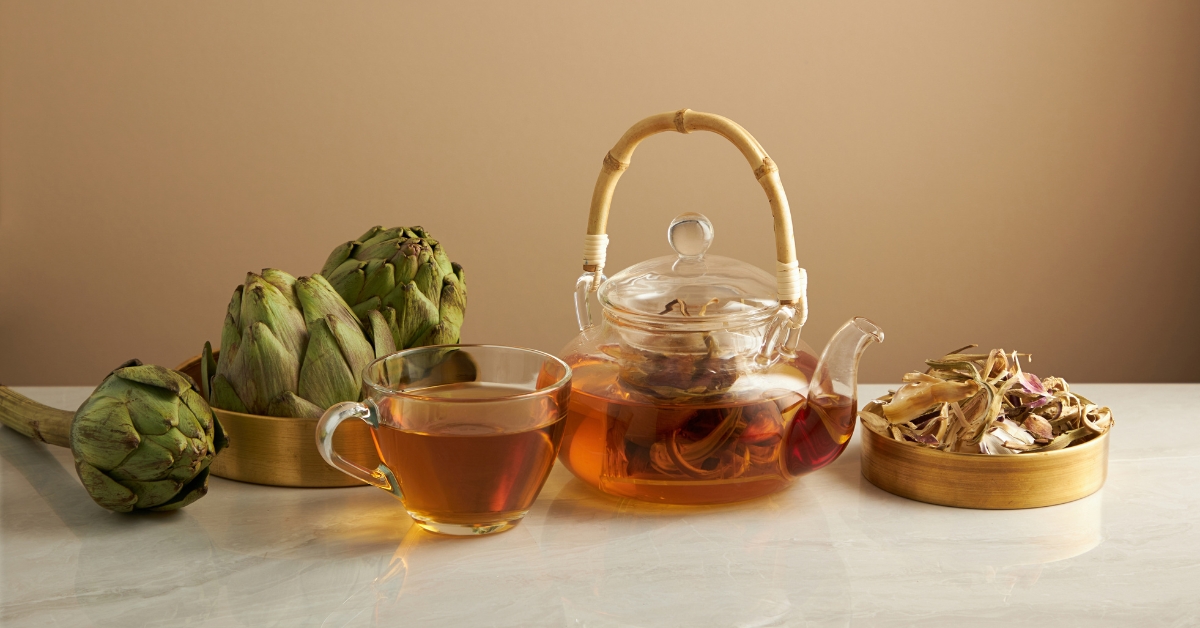
Artichoke Amplifier Tea
Ingredients:
- 1 ½ teaspoons dried artichoke leaf
- ½ teaspoon dried dandelion root
- ½ teaspoon dried fenugreek seeds
- 1 cup of boiling water
Preparation:
- Combine all herbs in a teapot.
- Add boiling water and steep for 10-12 minutes.
- Strain and drink twice daily morning and evening.
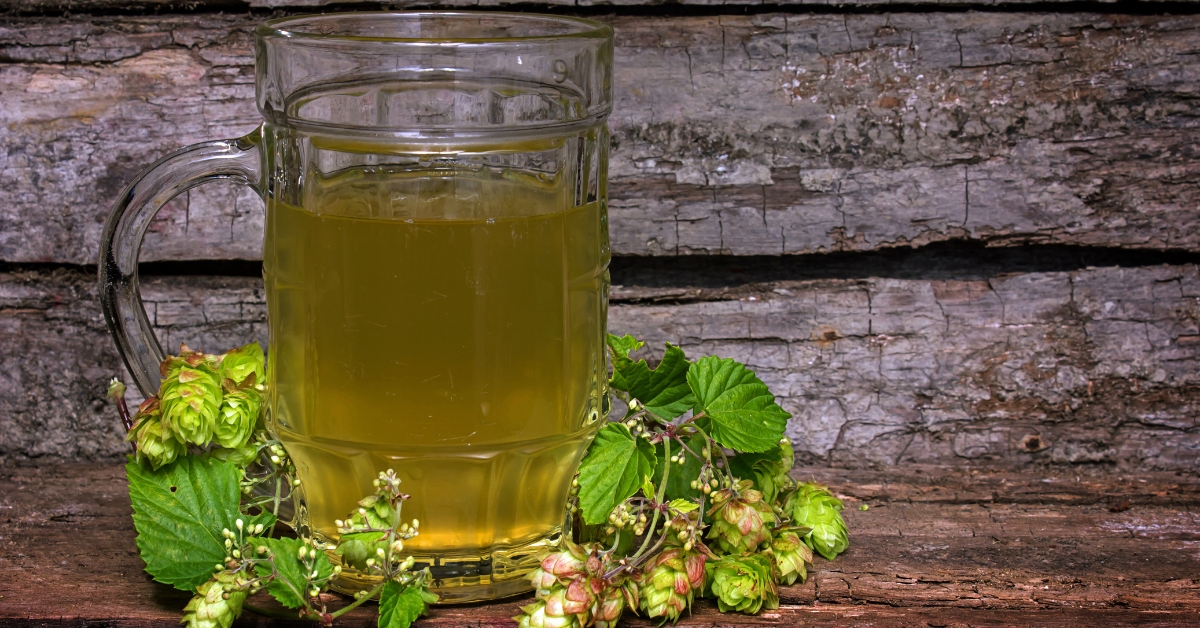
Potent Lipid-Lowering Infusion
Ingredients:
- 1 teaspoon dried artichoke leaf
- 1 teaspoon dried green tea leaves
- ½ teaspoon dried fenugreek seeds
- ½ teaspoon dried hops flowers
- 1 cup of boiling water
Preparation:
- Combine all herbs in a teapot.
- Pour boiling water over the herbs and steep for 12-15 minutes.
- Strain and drink twice daily morning and evening.
These tea recipes are designed to support cholesterol management naturally. Always consult a healthcare provider before starting any new herbal regimen, especially if you have existing health conditions or are taking medications.
☯️ Integrating Herbs into Daily Life for Bloating Relief
Incorporating cholesterol-lowering herbs into your daily routine can be an effective way to support heart health. Here are practical tips for using these herbs and complementary practices to enhance their benefits.
Daily Use and Lifestyle Integration
- ☕ Morning Green Tea: Start your day with a cup of green tea. This antioxidant-rich beverage may help support cardiovascular health. For variety, alternate between plain green tea and blends that include other beneficial herbs like dandelion or artichoke.
- 🌿 Artichoke and Fenugreek Supplements: Consider taking artichoke or fenugreek supplements with meals. These herbs may help reduce cholesterol levels when taken with food, as they can aid in the digestion and absorption process. Always follow the dosage instructions on the product label or as advised by your healthcare provider.
- 🍴 Cooking with Fenugreek Seeds: Incorporate fenugreek seeds into your cooking. Add them to soups, stews, or curry dishes for both flavor and potential cholesterol-lowering benefits. You can also sprinkle ground fenugreek seeds on salads or yogurt.
- 🌱 Dandelion Greens in Meals: Try dandelion greens in salads or sautéed as a side dish. These nutrient-dense greens can support liver function and may contribute to cholesterol management.
- 🍺 Moderation with Hop-Rich Beers: While moderate consumption of hop-rich beer varieties may offer some cardiovascular benefits, it’s important to note that excessive alcohol intake can negatively impact heart health. Moderation is key.
Additional Practices to Support Cholesterol Management
- 🥦 Dietary Adjustments: Focus on a heart-healthy diet rich in fruits, vegetables, whole grains, and lean proteins. Limit saturated fats and increase intake of foods high in soluble fiber, which can help lower cholesterol.
- 🏃♀️ Regular Exercise: Engage in moderate physical activity for at least 30 minutes most days of the week. This can help raise HDL (good) cholesterol and support overall cardiovascular health.
- 🧘♀️ Stress Management: Practice relaxation techniques such as meditation, deep breathing, or yoga. Chronic stress may affect cholesterol levels, so managing stress is crucial for heart health.
- ⚖️ Maintain a Healthy Weight: If overweight, losing even a small amount of weight can significantly improve cholesterol levels. Combine a diet with regular exercise for the best results.
- 🚬 Alcohol and Quit Smoking: If you drink alcohol, do so in moderation. If you smoke, consider quitting, as smoking can lower HDL cholesterol and increase the risk of heart disease.
- ⚕️ Regular Check-ups: Schedule regular check-ups with your healthcare provider to monitor your cholesterol levels and overall heart health. This allows for timely adjustments to your management plan if needed.
By integrating these herbs and practices into your daily life, you can take a proactive approach to managing your cholesterol levels naturally. Remember, herbal remedies should complement, not replace, conventional medical advice and treatment.
🌱 Navigating Herbs Safely
Starting with small doses is the first step when adding herbal remedies to your health routine. This approach lets you see how you respond and adjust amounts for the best effect, keeping safety in mind. While many herbs are safe, everyone’s body reacts differently. If you notice any side effects, it’s important to stop and think about what might be causing them.
Remember, herbs can sometimes interact with prescription medicines. These interactions might make your medicines work too well or not well enough, which is why talking to a healthcare provider or an herbalist is essential. This is especially crucial if you’re pregnant, breastfeeding, taking medications regularly, or have an existing health condition. Getting advice tailored to your situation can help you avoid any unnecessary risks.
For kids and older adults, being extra careful with herbs is important. Their bodies might react more strongly to herbal remedies, and the chance of side effects or interactions could be greater. Before giving herbal treatments to children or elderly family members, getting advice from a professional is a must to ensure their safety.
By being cautious and seeking expert advice when needed, you can make herbal remedies a safe part of your wellness plan. This careful approach allows you to enjoy the benefits of herbs while keeping yourself and your family safe.
While these herbs show promise, it’s important to note that more research is needed to fully understand their effects on cholesterol. Always consult with a healthcare professional before starting any new herbal regimen, especially if you have existing health conditions or are taking medications.
FAQ
What herbs can help lower cholesterol naturally?
Several herbs have shown potential in helping to lower cholesterol levels naturally. Green tea (Camellia sinensis) contains catechins that may reduce cholesterol absorption and increase excretion. Artichoke (Cynara scolymus) contains compounds that may inhibit cholesterol production in the liver and increase bile production to help eliminate excess cholesterol. Fenugreek (Trigonella foenum-graecum) is rich in soluble fiber, particularly galactomannan, that can help reduce cholesterol absorption in the intestines. Other herbs that might support healthy cholesterol levels include dandelion (Taraxacum officinale), which is traditionally used for liver support and may indirectly affect cholesterol levels, and hops (Humulus lupulus), which has antioxidants that may benefit cardiovascular health. While these herbs show promise, it's important to note that their effects can vary between individuals and should be used as part of a comprehensive approach to cholesterol management that includes a healthy diet and regular exercise.
How effective are herbs compared to cholesterol-lowering medications?
Herbs generally have a more modest effect on cholesterol levels compared to prescription medications like statins. While some herbs, such as artichoke and fenugreek, have shown cholesterol-lowering effects in studies, these effects are typically moderate and do not match the potency of pharmaceutical drugs. However, herbs can be a valuable option for people with mildly elevated cholesterol or those looking to naturally support their overall heart health. Herbs often have fewer side effects than medications and can be used alongside other lifestyle changes to manage cholesterol. It's important to note that herbs should not be used as a replacement for prescribed cholesterol-lowering medications without consulting a healthcare provider. For individuals with high cholesterol levels or at high risk of cardiovascular disease, a combination of lifestyle changes, herbs, and medication (if prescribed) may provide the most comprehensive approach to cholesterol management.
Are there any risks or side effects associated with using herbs for cholesterol management?
While herbs are generally considered safe for most people, they can have side effects and interact with medications. Green tea is safe for most adults, but high doses may cause caffeine-related side effects, such as insomnia, nervousness, and an increased heart rate. Artichoke extract is generally well-tolerated but can cause digestive discomfort, such as gas or bloating, in some people. Fenugreek may lower blood sugar levels, so people with diabetes should monitor their blood sugar closely when using this herb. It's crucial to consult with a healthcare provider before starting any herbal regimen, especially if you have existing health conditions or are taking medications. Pregnant or breastfeeding women should be particularly cautious with herbal supplements, as the safety of many herbs has not been well-studied in these groups. Additionally, the quality and purity of herbal products can vary, so it's important to choose reputable brands and follow recommended dosages. While herbs can be a valuable part of a cholesterol management plan, they should be used responsibly and under appropriate guidance.

